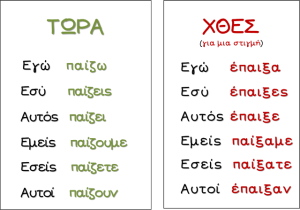Language/Modern-greek-1453/Grammar/Past-Tense
| ◀️ Present Tense — Previous Lesson | Next Lesson — Future Tense ▶️ |
Welcome to our lesson on Past Tense! In this lesson, we will explore the intricacies of the past tense in the Modern Greek. By the end of this lesson, you will have a solid understanding of how to use the past tense in various contexts.
After mastering the past tense, you can further enhance your Modern-greek-1453 grammar skills by exploring other related topics such as Comparative and Superlative Adjectives, Homonyms and Homophones, and Participle Spelling. Enjoy your journey into the fascinating world of Modern-greek-1453 grammar! 📚✏️
Past tenses
Verbs are words that state something about the subject of the sentence
and may express action, event,or condition. The Greek verb can take many different forms which may indicate properties: person, number, voice, tense and mood.
Tenses are forms of the verb which show whether the action, the event or condition expressed by the verb is placed in the past, the present or the future.
Past continuous / Παρατατικός
The verbs in “Παρατατικός ” express the continuing nature of the action or the event taken place in the past.
Example: [to be completed]
Simple past / Αόριστος
The simple past is used to describe an action, an event or condition that occurred in the past without duration.
Example: [to be completed]
Present perfect / Παρακείμενος
The present perfect expresses an action completed some time in the past with consequences that reach the present.
Example:
- 'Εχω γράψει το γράμμα και θα το ταχυδρομήσω.
- I have written the letter and I will to post it.
Past perfect / Υπερσυντέλικος
shows that the action described by the verb was completed before another past action or a certain point of time.
The past perfect is formed by using the past tense of the auxiliary verb : έχω (have)
- Είχα ξυπνήσει πριν χτυπήσει το ρολόι.
- I had been up before the clock struck.
Examples
Past continuous / Παρατατικός
| εγώ | έ-παιζ-α ( épeza ) | I was playing |
| εσύ | έ-παιζ-ες (épezes ) | You were playing |
| αυτός, - ή , -ό | έ-παι-ζε ( épeze | He/She/It was playing |
| εμείς | παί-ζα-με ( pézame | We were playing |
| εσείς | παί-ζα-τε (pézate ) | You were playing |
| αυτοί,-ές, -ά | έ-παιζ-αν ( épezan | hey were playing |
Simple past / Αόριστος
| εγώ | έ-παι-ξα ( épexa ) | I played |
| εσύ | έ-παι-ξες ( épexes ) | You played |
| αυτός ,-ή ,-ό | έ-παι-ξε ( épexe ) | He/She/It played |
| εμείς | παί-ξα-με ( péxame ) | We played |
| εσείς | παί-ξα-τε (péxate ) | You played |
| αυτοί ,-ές ,-ά | έ-παι-ξαν (épexan ) | They played |
Present perfect / Παρακείμενος
| εγώ | έχω παίξει ( echo péxi ) | I have played |
| εσύ | έχεις παίξει (echis péxi) | you have played |
| αυτός, -ή, -ό | έχει παίξει ( echi péxi) | he /she / it has played |
| εμείς | έχουμε παίξει (échoume péxi) | we have played |
| εσείς | έχετε παίξει ( échete péxi) | you have played |
| αυτοί, -ές, ά | έχουν παίξει (échoun péxi ) | they have played |
Past perfect / Υπερσυντέλικος
| εγώ | είχα παίξει ( îcha péxi ) | I had played |
| εσύ | είχες παίξει (îches péxi ) | You had played |
| αυτός ,-ή ,ό | είχε παίξει ( îche péxi ) | He/She/It had played |
| εμείς | είχαμε παίξει ( îchame péxi ) | We had played |
| εσείς | είχατε παίξει îchate péxi ) | You had played |
| αυτοί ,-ές ,-ά | είχαν / είχανε παίξει | They had played |
Author
- Ευγενική χορηγία που στοχεύει να βοηθήσει μαθητές ή μη, απανταχού της Γης, που επιδίδονται στην εκμάθηση της ελληνικής γλώσσας!
- Contribution bénévole visant à aider les personnes, partout dans le monde, qui sont engagées dans l'apprentissage de la langue grecque !
- Voluntary contribution aimed at helping people, all over the world, who are committed to learning the Greek language!
Other Lessons
- Irregular adjectives
- The combinations «αυ» and «ευ»
- Methods of Argument
- Imperative (Present)
- Word Accentuation
- Writing and spelling
- Basic spelling rules
- Verbes elliptiques, impersonnels et irréguliers
- Pronoms possessifs
- Syllabification
| ◀️ Present Tense — Previous Lesson | Next Lesson — Future Tense ▶️ |

